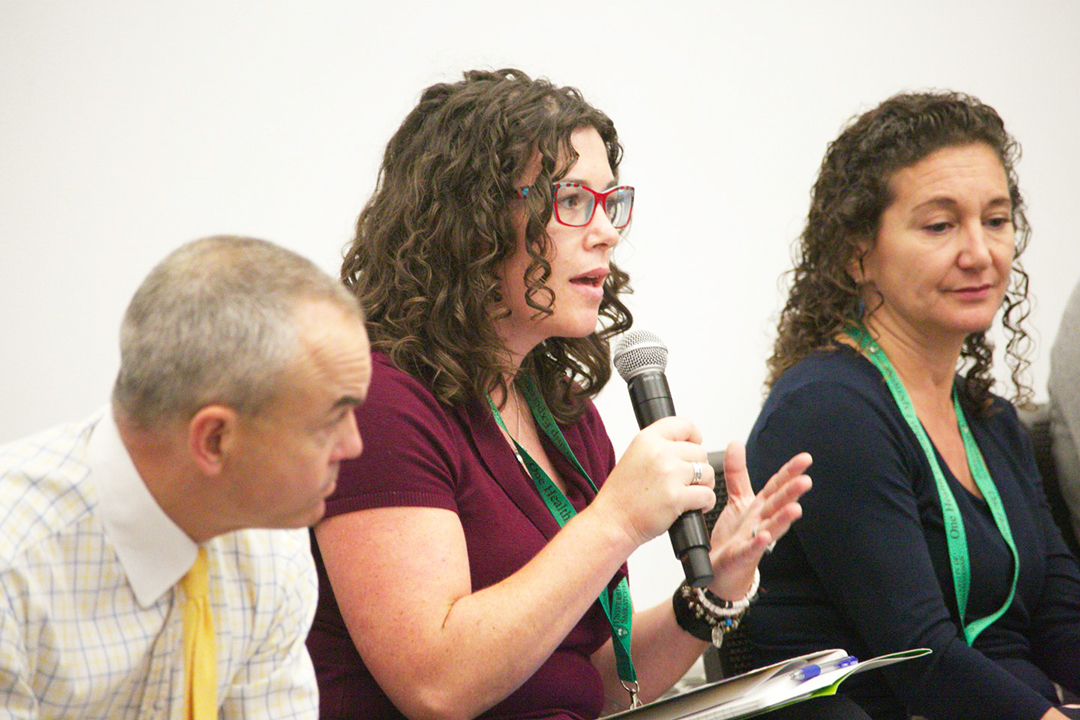
Conference features range of One Health speakers
The 2018 One Health Leadership Experience, which takes place in Saskatoon from Aug. 24 to 26, features speakers from a wide range of backgrounds and experiences in One Health. Here’s more information about this year’s guest lecturers and One Health leaders:
By WCVM TodayJason Johnson, DVM, MS, DACT: Johnson is the vice-president and dean of Lincoln Memorial University’s College of Veterinary Medicine. He’s also the executive director for the Center for Animal and Human Health in Appalachia. He serves in numerous leadership capacities within organized veterinary medicine including the American Veterinary Medical Association (AVMA) House of Delegates, Legislative Advisory Committee, AVMA Food Safety Advisory Committee and the Theriogenology Foundation.
Johnson wakes up every morning thinking about One Health and says it’s the gateway to a wonderfully diverse range of career opportunities for all professions.
“The major challenge in getting people to being a part of One Health is getting them to actually sit down with diverse groups, storm an idea, and act on it. When that happens, it’s magic,” says Johnson.
John David Kabasa, BVM, MSC, VM, PHD: John Kabasa is the principal of the College of Veterinary Medicine, Animal Resources and Biosecurity at Makerere University, Uganda. Kabasa is a founding director of the Africa Institute for Strategic Animal Resource Services and Development (AFRISA) and is a member of the One Health Central and Eastern Africa Network (OHCEA). He holds a variety of development positions in Uganda — he’s a national task force member on avian influenza, chair of the National Biodiversity Committee for the National Environment Management Authority, and chair of the Agricultural and Water Resources Task Force on Climate Change.
Craig Stephen, DVM, PhD: Dr. Craig Stephen is the executive director of the Canadian Wildlife Health Cooperative’s national office (based at the Western College of Veterinary Medicine). He was a founding director and president of the Centre for Coastal Health. His areas of expertise include the ecology of emerging diseases, health of marine and aquatic species, risk assessment, health surveillance, veterinary public health and associated health policy.
Stephen has four pieces of advice for students who want to pursue a career in One Health:
- Remember why you are doing this. One Health should be oriented to concomitantly promoting the well-being of peoples, animals and the environment. It’s not about blaming one sector for harms in another and it is not about advancing careers. You will be impactful if you are helpful.
- Be a good disciplinarian before trying to be a good interdisciplinarian.
- It is all about relationships — pay attention to them and foster the good ones.
- Learn some sociology. Change is all about getting people to do something different than what they are doing now.
Timothy L. Sellnow, PhD: Dr. Timothy L. Sellnow’s research focuses on bioterrorism, pre-crisis planning and strategic communication for risk management, and mitigation in organizational and health settings. He has conducted funded research for the Department of Homeland Security, the United States Department of Agriculture, the Centers for Disease Control and Prevention, the Environmental Protection Agency, and the United States Geological Survey. He has also served in an advisory role for the National Academy of Sciences and the World Health Organization.
Deanna D. Sellnow, PhD: Dr. Deanna D. Sellnow’s research focuses on strategic instructional communication in a variety of contexts including risk, crisis, health and online settings. She has conducted funded research for the United States Geological Survey, Department of Homeland Security, and Centers for Disease Control and Protection. She has also collaborated with agencies such as the International Food Information Council about food security across the globe.
Jane Smith: Jane Smith is a St. John Ambulance Therapy Dog Program volunteer. Jane has extensive experience volunteering and working with dogs in the health care system from her extensive volunteer efforts with St. John Ambulance. She has volunteered at the Royal University Hospital, the Irene and Leslie Dubé Centre for Mental Health, and the Parkridge Centre Special Care Home. Jane and her therapy dog, Murphy, also participated in a study involving veterans in a long-term care facility. Since 2015, Jane has been involved with Murphy in the first evaluation of the emotional benefits of a St. John Ambulance Therapy Dog Team in the Royal University Hospital’s (RUH) emergency department.
Lacey Jurke: Lacey Jurke is a second-year U of S medical student who was involved in research evaluating the use of St. John Ambulance therapy dogs in the RUH emergency department. She is very interested in seeing how animals can affect humans’ experiences in the emergency department, contributing her growing knowledge of animal behaviour, animal health and human medicine. She intends to use the data from her research studies to change how she implements health care as a physician in the future to better serve her patients.
Joe Rubin DVM, PhD: Dr. Joe Rubin is veterinarian and microbiologist and has expertise in the areas of animal health, infectious disease, epidemiology and canine-borne zoonoses. His primary area of expertise is antimicrobial-resistant bacterial pathogens in companion animals. He is a resource for the U of S research team members who are evaluating the use of therapy dogs in a human emergency department. Rubin provides information about the risks of transmission and intervention strategies for preventing transmission from therapy dogs to human patients.
For more information about the OHLE and the registration process, please visit www.usask.ca/wcvm/ohle. Registration closes at midnight, Aug. 20.